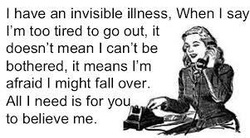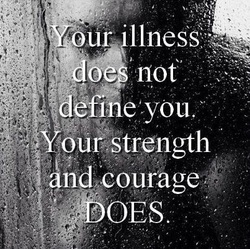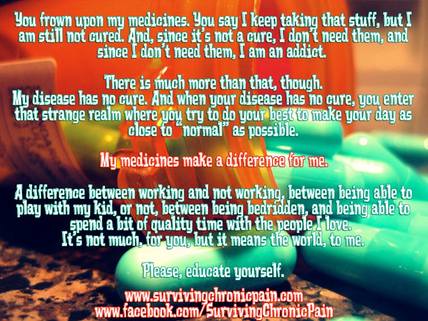
In the blink of an eye, you life can change due to a diagnosis of a chronic, incurable disorder. You are forced to come to a screeching halt before taking a sharp turn. Your goals, dreams, and priorities must change. You may grieve and feel the loss of your former self; however, you become grateful for the little things in life--the things that seemed too trivial to notice previously . Worrying about life's minutiae suddenly takes up less of your time. You must now determine how to use each and every ounce of energy, and make it count. Your energy must be spent on people and things that are meaningful to you. Needless drama is cut out of your life. This new life can be confining in ways, but also liberating. Live it.

I hate cancelling plans. I absolutely despise having to make the call (or send an email) in order to let someone down. It makes me feel like a huge disappointment of a person. My other choice is to simply not make plans at all, but then I begin to feel like a hermit. If I have something on my schedule, that means I'm not turning into a recluse, right?
I find myself in the cancelling conundrum all too often. My close friends and family know of my condition, although some do not know of the extent of my disability. How to tell them why I need to cancel without scaring them? Or making them feel like they need to visit and take care of me? Being honest is important, but sometimes I don't want to reveal all of my personal information (TMI much?). I also don't want to trivialize what is happening. I feel like I'm am constantly doing a delicate balancing act to keep people informed, yet protected. And that state of being is lonely.
My balancing act applies not only with the making and breaking of plans; I do this for all aspects of sharing my life with EDS. I will always tell people enough so that our relationship can function; however, I keep much of what I'm going through to myself. Even my husband does not know 100%--I will always withhold some information. I do this in order to protect him and his mental state (he really doesn't need to know how many times things dislocated today) and to keep my independence (if he did know everything, he would be afraid to let me do anything).
This balancing act probably sounds insane to the majority of people. But, I expect for those with chronic illness, it will sound familiar. I would love to hear your thoughts in the comments.

There are days (like today--another rainy, damp, icky one) where it is hard to separate myself and my EDS. My EDS is so intertwined with everything about me: how I feel, how I act, how I move. It's hard to remember that EDS is NOT me. Of course, it's become a part of my life, a much larger part than I ever would have imagined. However, facing pain and disability has also forced me to grow as a person--to become stronger, more observant, more flexible, more patient. I've slowed down a lot, but I've gained a perspective on life that I was never allowed before, always rushing from place to place. EDS has, of course, changed me. But it is not me.

But of course I'm going to add a bit. There is a huge difference between addiction and dependence. Many individuals (and some physicians) will try to convince you that it is a distinction without a difference, but this is false. Addiction is misuse or abuse of a drug, usually to obtain a high. As an EDS patient, if your pain becomes intolerable and the doctor increases your medication, this DOES NOT make you a drug addict. In fact, most people in pain do not reach any type of high, just pain control. If your EDS were to suddenly disappear you would be tapered off the medication and be drug free again. Much of the same holds true to other medications like steroids and some antidepressants. Pain can cause nausea, anxiety, agitation, depression, feelings of isolation, hopelessness & helplessness. Good pain control can give you quality of life and increase functioning. Pain Control Clinics and knowledgeable physicians can help you obtain the best medication regime for your pain level and lifestyle. You do not have to suffer in pain.




 RSS Feed
RSS Feed